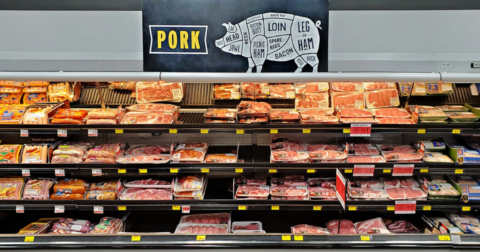Explainer
How Many Animals Are Killed for Food Every Day?
Food•7 min read
Reported
Documents reveal a proposal to train PhDs on how to boost public trust in pork.


Words by Sophie Kevany
The pork industry is launching a new multi-million dollar communications partnership with five public land-grant universities in the U.S. According to the industry group’s website, the $8.5 million Real Pork Trust Consortium will fund programs aimed at building “trust between pork producers and pork consumers.”
The five partner universities are Iowa State, University of Georgia, North Carolina State, North Carolina Agricultural and Technical State University and the University of Minnesota. The Real Pork Trust Consortium is funded by what are called Checkoff programs, “a massive tax system that gathers some $700 million per year” from farmers for marketing programs. At the end of 2023, the Pork Checkoff had brought in funds totaling just over $82 million.
The proposal for the Real Pork Trust Consortium and other related documents were provided in response to a Freedom of Information Act request made by Crystal Heath of Our Honor, a non-profit aimed at empowering veterinarians to advocate for animal ethics.
According to the proposal, these partnerships will build trust with “listening sessions across the U.S.” with “diverse stakeholders” to hear “thoughts and concerns while learning about consortium efforts.” Another aim is described as creating “swine industry experiences for retailers, journalists, consumers…to see pork production practices in person.”
The pork industry has made no secret that it has ratcheted up efforts to oppose the animal welfare provisions put into place as a result of California’s Proposition 12, which required a modest improvement in space for some farm animals over the industry standard size for confinement, including gestating pigs. Part of these efforts seem to include rebuilding trust with consumers — in fact, a number of meat industry groups have made clear that engaging consumers on animal welfare issues is now a top concern.
Under the terms of the proposed Consortium, the five public land grant universities will create entire PhD programs for students to acquire a doctorate in building trust for the pork industry. One Iowa State PhD position has been advertised as: “Enhancing trust in pork production and products through strengthening communications, research and training,” for instance. Out of the $8.5 million Checkoff funding proposal, about $700,000 is allocated for PhD students’ tuition over the five-year period.
Both the Checkoff funding proposal and PhD position refer to addressing “the propagation of falsehoods and myths around pork production practices.” Asked by email what falsehoods and myths needed combatting, the National Pork Board declined to respond.
In fact, the National Pork Board did not respond to a range of questions about whether: the $8.5 million might be better spent on improving pig living conditions; it had any plans, as part of this project or any other, to reduce the number of pigs produced in the US; it accepted the need, especially in richer countries to breed and eat less meat for a range of reasons that include public health, the environment and animal welfare, and, whether any of the $8.5 million would be used to reduce the use of medically important antibiotics in the U.S. pig sector which, according to the latest FDA data, rose almost 5 percent by volume in 2022.
In a statement provided to Sentient, what the Pork Board did say is this: “the research funded by the Pork Board is scientific and peer reviewed. We rely on the expertise of a variety of university professionals across several disciplines to develop sound methodologies and conduct studies that can be both scrutinized and defended for their academic rigor. We are proud of the important work the consortium is undertaking to advance the industry’s understanding of consumer preferences and behavior.”
Out of the 20 consortium researchers shown on the webpage, just two focus on animal welfare. The funding proposal shows money primarily flowing to Iowa State, North Carolina State and North Carolina Agricultural and Technical State University.
One of the documents obtained by FOIA request reveals a suggestion that the Real Pork Trust Consortium meet with the “CLEAR Center” to discuss “[s]ustainability work that is underway.” This appears to be a reference to the U.C. Davis CLEAR Center, a public university communications and research program directed by scientist Frank Mitloehner, and one of two academic centers evaluated in a new paper investigating meat industry influence in academic institutions.
Co-authored by researchers Jennifer Jacquet and Viveca Morris, the paper traces efforts by U.S. animal agriculture companies to fund academics who promote industry-led climate “solutions” to the public over policies and messages to curb meat consumption. Ties between the animal agriculture industry, the CLEAR Center and Colorado State University’s AgNext research group, “have helped maintain the livestock industry’s social license to operate not only by generating industry-supported research, but also by supporting public relations and policy advocacy,” the paper found.
A 2022 New York Times investigation made the case that Mitloehner, the CLEAR Center and its funding by industry donations — including a National Pork Board donation of $600,000 the Morris-Jacquet paper found — are part of an industry-coordinated effort to diminish meat’s role in climate change.
“Public universities are supposed to serve the public,” Morris tells Sentient. “Instead, these universities appear to be serving pork corporations by using their reputations for independence and credibility to increase public trust in pork products,” she says.
Emails sent by Sentient to the universities involved in the Consortium asking questions, including whether any of the 14 people named on both the Pork Checkoff funding proposal and Consortium website felt their reputation as independent academics risked being compromised by pork sector payments, produced no responses.
For Crystal Heath, the funding proposal could be seen as an attempt to influence independent state universities and academics meant to serve the public, in order to turn them into pork industry supporters. But for the academics already in alignment with the industry’s wishes, “they possibly were given these positions and now this funding because their ideologies aligned with corporate ideologies.”
That alignment can have devastating consequences, says Heath. “Science is influenced by the questions we ask, and it’s concerning when the questions being asked and funded at our public research universities come from corporations that want to make consumers feel better about purchasing products that harm and exploit animals.”